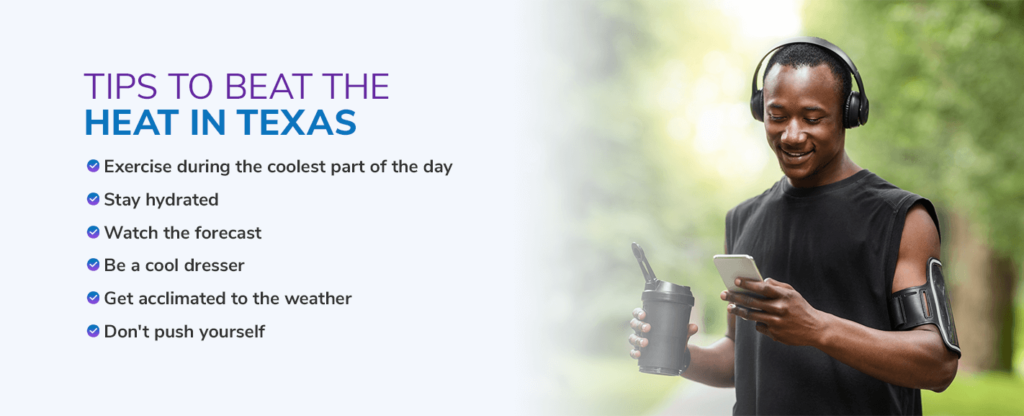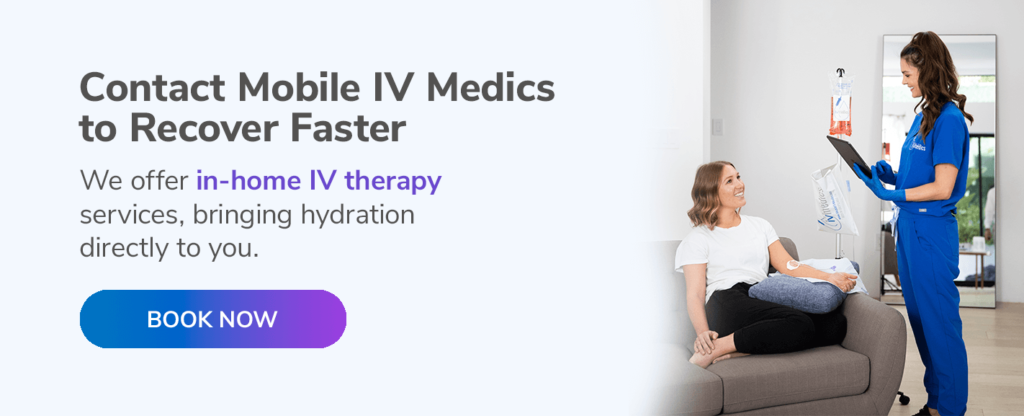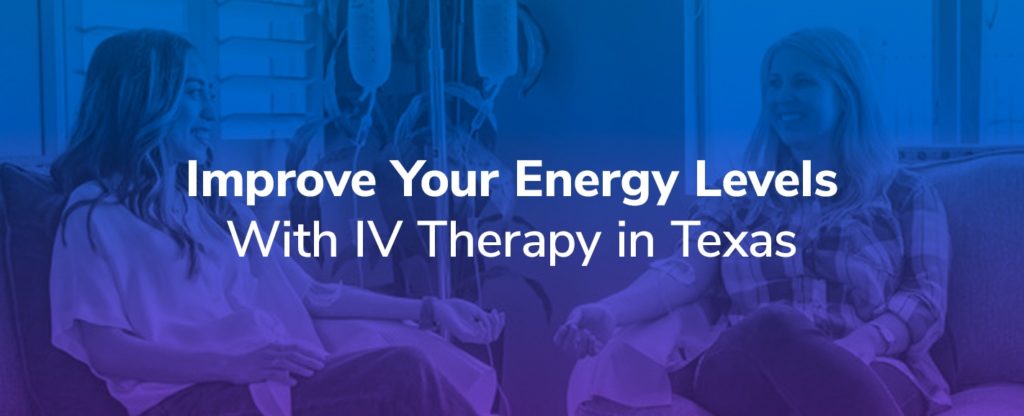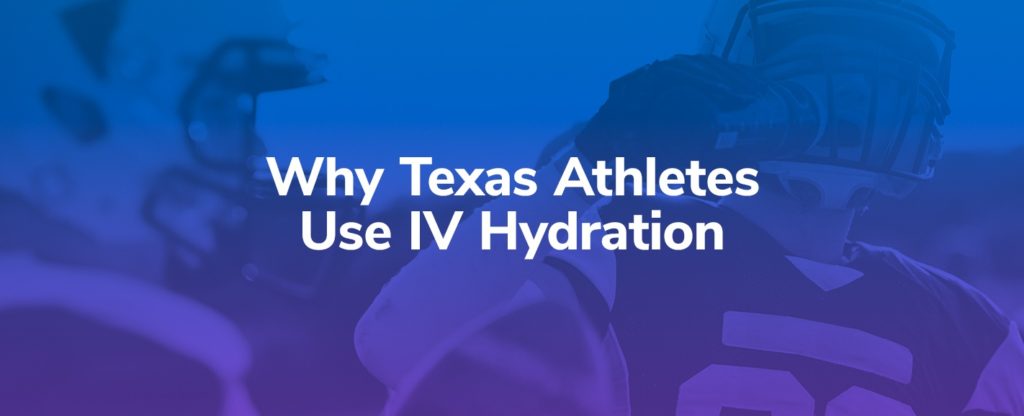Some might call a Texas summer suffocating, while others describe it as unrelenting. No matter what word you use, you probably agree that Texas summers are no joke. With temperatures often rising beyond 90 degrees Fahrenheit, a summer day in Texas can leave you feeling drained, cranky and sick. In some cases, prolonged exposure to heat can be dangerous and even life-threatening.
These possibilities don’t mean you need to trade your Texas vacation for a trip to Antarctica. Fortunately, heat-related illnesses are preventable, and there are plenty of ways to stay cool and hydrated. In this post, we share tips for beating Texas’s brutal heat and show you how to recover if you’ve had a bit too much fun in the sun.
- What Is Heat Exhaustion?
- What Is Heatstroke?
- Tips to Beat the Heat in Texas
- How to Recover From Heat Exhaustion
- Contact Mobile IV Medics to Recover Faster
What Is Heat Exhaustion?
Heat exhaustion occurs when your body overheats. Usually, your body cools itself by sweating. However, sometimes sweating isn’t enough to keep your body cool, especially if you exercise in hot weather.
You might also sweat a lot and lose more fluids than you replenish on a hot day. Unless you drink plenty of fluids, you can become dehydrated, making it harder to sweat and stay cool. When your body can’t cool itself efficiently, your internal temperature rises.
This experience can cause a range of symptoms, such as:
- Dizziness
- Nausea
- Headache
- Fatigue
- Heavy sweating
- Muscle cramps
- Cold, pale skin
- Rapid, weak pulse
- Fainting
If left untreated, heat exhaustion can lead to heatstroke. It’s crucial to rehydrate and rest in a cool area to keep heat exhaustion from getting worse.
What Is Heatstroke?
Heatstroke can happen if your body overheats and reaches an internal temperature of 104 degrees Fahrenheit or higher. You might experience heatstroke if you exert yourself in hot weather or spend too much time in a hot environment.
Symptoms of heatstroke may include:
- High body temperature
- Confusion
- Irritability
- Throbbing headache
- Dry, hot, red or damp skin
- Nausea
- Vomiting
- Strong, fast pulse
- Rapid breathing
Heatstroke is the most severe type of heat-related illness and requires emergency medical care.
Tips to Beat the Heat in Texas

Although there’s no way to turn the heat down in Texas, you can keep yourself safe and healthy by taking precautions.
Here are tips to prevent heatstroke and heat exhaustion during a long Texas summer:
- Exercise during the coolest part of the day: You can still get in your daily jog or walk during the summer if you go outside in the morning or after sunset. You’ll want to avoid physical activity outdoors during the afternoon when the sun is high in the sky. Ensure you still take breaks and drink plenty of fluids if you exercise outdoors, no matter the time of day.
- Stay hydrated: Drinking plenty of water is one of the most important things you can do to prevent a heat-related illness. Drink more water than you usually would when you’re in the heat — and don’t wait until you’re thirsty. You’ll want to consume two to four 8-ounce cups of water every hour. Also, be sure to avoid beverages that can cause dehydration, like alcohol or caffeine, especially before exercising outside.
- Watch the forecast: On some days, it’s just better to stay in the air conditioning. If a heat wave’s on its way, reschedule outdoor activities for another time or bring them indoors if possible. If you don’t have an air conditioner, consider spending the afternoon in the library or mall or taking a cool shower to bring your body temperature down. At night, you can use cross-ventilation to draw cool air into your home and push hot air out. This can help you feel less thirsty at night as it cools you down.
- Be a cool dresser: We don’t mean wearing the latest trends! Wear loose, light-colored clothing when heading outside on a hot day, and remember your hat and sunscreen. It’s essential to protect yourself from the sun because a sunburn can make it harder for your body to cool down.
- Get acclimated to the weather: If you’re used to cooler weather or usually exercise in the air conditioning, give your body time to adjust to the heat. It can take at least a week or two for your body to adapt to higher temperatures, so avoid intense exercise outdoors at first. You can gradually increase your workout’s length and intensity over time.
- Don’t push yourself: Listen to your body if you start to feel too hot and take steps to cool down. If you experience symptoms of heat exhaustion that don’t improve after a few minutes of resting in the shade or air conditioning, get medical attention. If you, a friend, or a family member show signs and symptoms of heatstroke, call 911 immediately.
How to Recover From Heat Exhaustion
Did you spend too much time in the summer heat? You may not be feeling too great. Heat exhaustion can range from mild to severe, and it might take time to develop or come on suddenly. If you suspect you have heat exhaustion, take these steps to cool down:
- Stop what you’re doing and move to a cooler area, such as an air-conditioned building or shaded spot.
- Apply wet, cold towels to the back of your neck, forehead, and wrists, or take a cool shower.
- Lie on your back with your legs elevated to improve blood flow.
- Replace lost fluids by sipping water.
The above steps should help you feel better in about 15 minutes, but it may take several days to recover completely. As you recover from heat exhaustion, it’s essential to keep yourself out of the heat and rest as much as possible.
One way to accelerate your recovery is to receive IV hydration therapy. With IV hydration therapy, a nurse will administer saline solution intravenously to rehydrate you quickly. Normally, it might take hours for your body to absorb water from drinking, whereas IV therapy delivers fluid directly to your bloodstream. This process can relieve symptoms of dehydration fast and have you feeling refreshed and energized. You may feel the effects of IV hydration therapy for up to a few days after the procedure.
You can also add vitamins, minerals and medication to your hydration package to help you recuperate. Your nurse will recommend the best solution for you and your needs.
Contact Mobile IV Medics to Recover Faster
At Mobile IV Medics, we know how harsh Texas summers can be, but we’re here to help you pull through and feel your best. We offer in-home IV therapy services, bringing hydration directly to you. In other words, you can stay out of the sun as you rest and recover from heat exhaustion and receive our services in the comfort of your home.
Contact us today to learn more about our IV therapy packages, check out our service areas or book your appointment to feel better faster.






